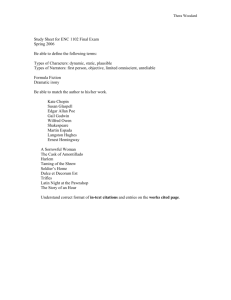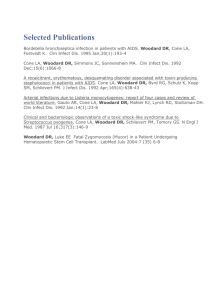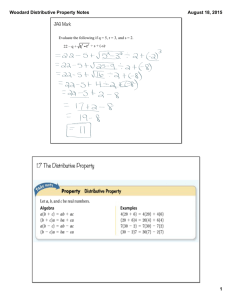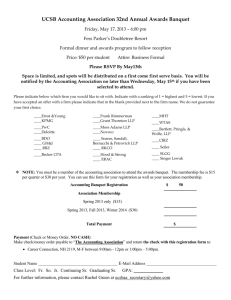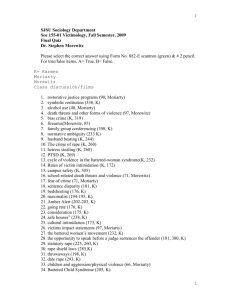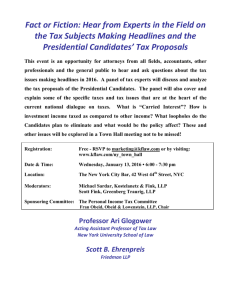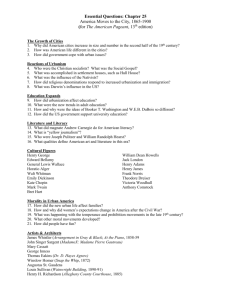Final Office Action Practice
advertisement
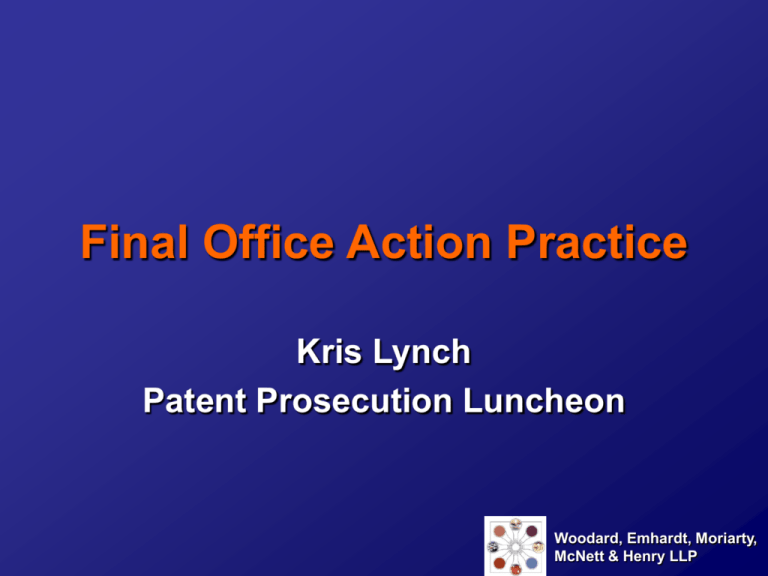
Final Office Action Practice Kris Lynch Patent Prosecution Luncheon Woodard, Emhardt, Moriarty, McNett & Henry LLP Final Rejection Defined • 37 C.F.R. § 1.113-114 • MPEP 706.07, 714.12-13 • May be issued on a first action – continuations having claims drawn to same invention as the parent and would have been a proper final rejection if entered in parent • Typically issued in a second or subsequent action Woodard, Emhardt, Moriarty, McNett & Henry LLP Was the Final Action Proper • Did the examiner introduce a new ground of rejection that is neither necessitated by applicant's amendment of the claims nor based on information submitted in an information disclosure statement filed after final? MPEP § 706.07(a) • If so, request that Examiner withdraw finality of the office action – Example: amendments after final were not entered but receive a final rejection in a first action in a continuation Woodard, Emhardt, Moriarty, McNett & Henry LLP Options for Responding • File a response w/ or w/out an amendment under 37 C.F.R. § 1.116 – Amendments at discretion of examiner – Possible interview • File a declaration under 37 C.F.R. § 1.132 • File a continuing application or request for continued examination (RCE) – Done to enter an amendment or consider new art – More time to prepare a declaration • Appeal to the Board of Patent Appeals and Interferences under 37 C.F.R. § 1.191 Woodard, Emhardt, Moriarty, McNett & Henry LLP File a Response • Argue on the merits that the cited references do not apply – Examiner unlikely to withdraw final rejection if same arguments are presented • Likely only useful where remaining rejection(s) is very minor or where it is believed the Examiner has made an oversight Woodard, Emhardt, Moriarty, McNett & Henry LLP File an Amendment and Response under 37 C.F.R. § 1.116 • To comply with Examiner’s suggestions • To reduce issues on appeal i.e., cancel claims • To present claims in better form for consideration on appeal • If they raise new issues of patentability, the Examiner will likely refuse to enter them Woodard, Emhardt, Moriarty, McNett & Henry LLP Advisory Action • If reply to final office action within 2 months, the shortened statutory period will expire at 3 months from final office action or from the date the advisory action is mailed from the PTO, whichever is later – Save on extension fees – In no event can the statutory period expire later than 6 months from date of final office action Woodard, Emhardt, Moriarty, McNett & Henry LLP File a Continuing Application • Continuation, divisional or CIP under 37 C.F.R. § 1.53(b) – Different filing date and serial number • Continued Prosecution Application under 37 C.F.R. § 1.53(d) (Designs only) Woodard, Emhardt, Moriarty, McNett & Henry LLP File a RCE under 37 C.F.R. § 1.114 • Removes finality of most recent office action – Can be done by certificate of mailing – Same filing date and serial number • Requires a “submission” – Typically a response under 37 C.F.R. § 1.111 if an outstanding office action exists • Also requires a fee set forth in 37 C.F.R. § 1.17(e) Woodard, Emhardt, Moriarty, McNett & Henry LLP Continuation vs. RCE • Continuation if want to keep application pending longer to target infringers or to provoke an interference – or to prepare a declaration • Continuation if some claims are allowed and want an issued patent while pursuing rejected claims in another application • Continuation if claims are going to be independent and distinct from parent 37 C.F.R. § 1.145 Woodard, Emhardt, Moriarty, McNett & Henry LLP Continuation vs. RCE Continued • RCEs generally have a lower cost – Save on additional claim fees • RCEs have a faster turnaround time • Generally no double patenting issues • Easiest choice if looking to simply have an amendment or piece of prior art considered Woodard, Emhardt, Moriarty, McNett & Henry LLP New PTO Rules (Rumors) • If received first office action on the merits – 2 Continuations + 1 RCE • If no first office action on the merits – 3 Continuations + 1 RCE • No limit on divisionals • Possible implementation in SeptemberNovember Woodard, Emhardt, Moriarty, McNett & Henry LLP Strategies for New Rules • Review applications to determine how many continuations/RCEs have been filed or are likely to be filed in the future • Only option at final may be to appeal Woodard, Emhardt, Moriarty, McNett & Henry LLP Appeals • Can appeal any claim that has been rejected twice – Doesn’t require a final action • File a Notice of Appeal under 37 C.F.R. § 1.191(a) – Within 3 months extendable to 6 months – Used as a tool to avoid abandonment • File an Appeal Brief under 37 C.F.R. § 192(b) – 2 months from of Notice of Appeal (measured from day of receipt) extendable for another 5 months – Can also file an RCE which effectively removes the appeal request MPEP § 1215.01 Woodard, Emhardt, Moriarty, McNett & Henry LLP Pre-Appeal Brief Conference Pilot Program • File at same time as Notice of Appeal – 5 or less total pages – Decision within 45 days • Use if rejections are clearly not proper and are without basis – e.g., limitation is not met by a reference or the Examiner failed to show proper motivation for making a modification in an obviousness rejection Woodard, Emhardt, Moriarty, McNett & Henry LLP Appeals Continued • Board reverses: – Forwarded to Examiner to issue a Notice of Allowance • Board Affirms: – Abandonment – File continuation • Abandon parent – Petition Board for rehearing under 37 C.F.R. § 1.197 – Bring civil action in district court for DC under 35 U.S.C. § 146 – Appeal to Federal Circuit Woodard, Emhardt, Moriarty, McNett & Henry LLP Final Action Strategies • Some Allowed Claims – Respond to try and overcome the rejected claims – Cancel rejected claims and pursue them in a continuation • May not be best option once new rules are implemented • May end up on appeal Woodard, Emhardt, Moriarty, McNett & Henry LLP Final Action Strategy Continued • All Claims Remain Rejected – Try to negotiate allowance with the Examiner – RCE or Continuation • Consider filing notice of appeal to delay response – Appeal • To limit prosecution history • If no intention of amending or otherwise limiting claim scope Woodard, Emhardt, Moriarty, McNett & Henry LLP

